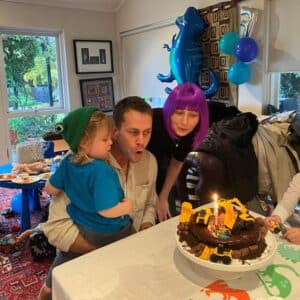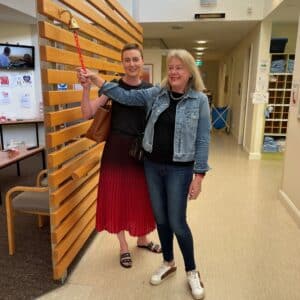
In January 2021, my family moved to Perth from Sydney. I discovered a lump in my breast while I was in home quarantine. I couldn’t get a mammogram and biopsy until I was out of isolation. I had a feeling the news wouldn’t be good and it wasn’t – I had triple negative breast cancer. Within days of my diagnosis, my cancer had been staged, I’d had scans done and was ready to start chemo.
After eight cycles of intense chemotherapy, I was asked to decide about surgery and whether I wanted a lumpectomy or a mastectomy. This was an overwhelming decision, especially as a young woman. I didn’t know what to do. The doctors, nurses and surgeons were fantastic, but I needed emotional support and information to help me make informed decisions. I had to find this for myself.

Michaela and her family
I asked around and got in contact with some other young women who had breast cancer. We formed our own group where we could talk about any issues or things we were facing. If I hadn’t had this group, I think I would’ve really struggled mentally. These women got what I was going through.
During my treatment, we lived with my Mum. Getting my son to daycare, arranging care for him while I was at medical appointments or just being in the right mindset for him was a struggle during treatment. My Mum became my son’s mother for those six months. I know a lot of other families that don’t have that kind of support. I felt very lucky, but it was also really hard for Mum. She was watching me go through everything as well as looking after my son. She needed support as well.

Michaela and her Mum
The financial stress that comes with cancer is extreme. We had private health insurance, but that doesn’t cover it all. All of this puts a massive burden on people living with cancer and their families.
I was so happy to hear that there is going to be a Comprehensive Cancer Centre in WA. It will make a huge difference to people going through cancer in so many ways.
- Access to health professionals that specialize in caring for people with cancer and can answer all the questions around the treatment journey and help with decision making.
- Access to cancer drugs and clinical trials. Cancer drugs are highly specialized. Some WA people have to go interstate for treatment because they can’t get the drugs or on a trial here. The clinical trials capability
- Access to peer support groups. The group I had made such a big difference, but I had to find this group for myself. Talking to people of a similar age with a similar cancer gives a valuable perspective on how you’re going to get through your cancer or your treatment or what’s ahead in five years’ time.
- Access to supportive care services like Solaris. I was halfway through my radiation when one of the nurses told me about Solaris. The Solaris team were amazing. They gave me free massage, Reiki and foot reflexology. These all helped me focus on something other than my treatment.
- Education for people about the early signs of cancer. A lot of people ignore those signs, and the outcomes are a lot worse.
When you’re going through cancer treatment, you just want to get to the end of it. It’s not until later that you realize the amount of pressure you’ve been under physically, financially and socially. The Comprehensive Cancer Centre will go a long way towards easing that pressure for everyone.
